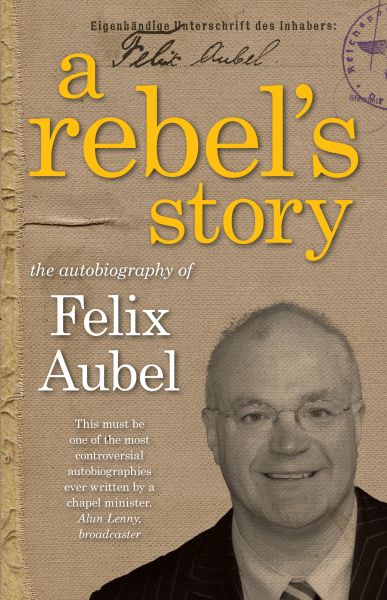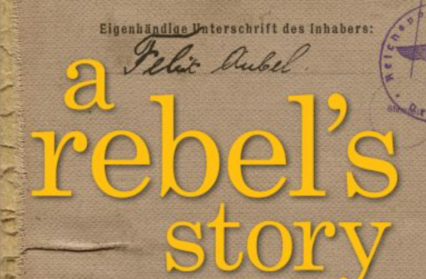Adam Somerset reviews A Rebel’s Story, Felix Aubel’s controversial memoir, depicting his unusual route into British politics.
A Rebel’s Story was first published in 2010. Its updated appearance in English, writes Felix Aubel in his foreword, is a result of favourable critical and public reception. Contemporary political memoir in Wales is uncommon, surprisingly in this last period of galvanic change. For three decades Felix Aubel has been a battling player in the debates of change. His memoir is both evocation of those days and portrait of a particular persona, one of fierce conviction and distinctive, some might even say quirky, characteristics.
The young Aubel’s entry to the role of repeated candidature for the Conservative Party comes about indirectly. Attitudes for a lifetime are laid down within a few short, but formative, years. The first election of which he is aware is the 1974 ‘Who Governs Britain?’ contest. His family, valleys-rooted, is powerfully against the government’s yielding to the miners’ wage claims.
Aubel is aged nineteen for the last year of the Callaghan government with its mountains of rotting litter and bodies in mortuaries unburied. He is first drawn, like a whole class of political ingenues, to the embryonic Social Democratic Party. In the 1983 election he represents a party with fewer than twenty members in the constituency. He comes a decent second, cutting the Labour majority in Aberdare by seven thousand.
He then follows a different political trajectory from most SDP members. On the Miners’ Strike – ‘which left-wing academics seek to romanticise’ -he is implacable. No ballot means no legitimacy. By 1987, he is in Llandudno meeting Mrs Thatcher and ‘hugely impressed by her.’ In 1997 he is fighting the Ceredigion seat. Not only is there a Britain-wide swing against the Tories, but he has to face boundary changes, tactical voting by his supporters for Cynog Dafis, and ‘English settlers’ who, in his view, vote Plaid to ingratiate themselves. He has small time to reflect on his fifteen percent vote as the issue of devolution is already calling.
Aubel’s politics are those of public conviction placed before private calculation. Early on a Labour insider confides that Westminster is likely his, if he will just conform. But the conservative has much in common with the churchman, whose calling he follows. Both know, in their hearts, that they are beholden to generations gone by and that they themselves are custodians for the generations to come. Aubel believes in the Union. It is never a question of pragmatic particulars, of tax rates and local advantage. He believes in it, like he believes in the divinity, because it is true and right and good.

by Felix Aubel
A Rebel’s Story circles round the unanswered question, and the paradox, of representative government. He has himself not attained public office, so it will never be known what he might have brought to the Commons or to the formative years of the Assembly. He exemplifies the paradox that the extroversion and the energy, that the hustings and the campaign demand, has but small relation to capacity for executive competence.
Aubel certainly yearns for personality in politics. A strain of populism underlies his view of Cardiff with its few who are ‘prepared to speak their mind and say what many people are really thinking.’ It is the same frame of mind that leads him to applaud George Galloway on the Aberystwyth stage. He pays nine pounds for his ticket for the ‘one-man show…was to prove to be excellent entertainment.’
This kind of ‘Question Time’ populism is not difficult. In office it fails, in that popular opinion is not just manifold but filled with self-contradiction. But he never loses that popular appeal of a lack of prevarication. His view on the Coalition’s first budget is forthright. He deplores the debt and its interest charge of £120,000,000 – that is, he says, per day. ‘I have never used a credit card,’ he writes. In his own life he pays cash. His Wales would have no place for Wonga and its ilk.
Aubel’s background is distinctive. The first chapter is given over to his father, also Felix, and his experience in Slovenia of invasion and civil war. Father Felix has a brief respite from upheaval and violence on the farm of boxer Max Schmeling, well out of favour with the Nazis after his defeat by Joe Louis. Felix the son has that rootedness in Wales, that permits an unabashed combativeness in taking on everything that he dislikes.
It is hardly needed but he tramples over the True Wales campaign in the 2011 referendum. He has small sympathy with the Welsh Language Board, derides the plan to translate every Assembly word from English, spells out just what it costs to keep ‘Barn’ and ‘Golwg’ going. Glyndwr is just plain ‘bloodthirsty.’ In its attitudes the ‘respectable’ Welsh-speaking middle class is mired in hypocrisy. Aubel’s are the swingeing views that require the boldness of the insider.
It is an unusual biography. Aubel is, after all, barely into his fifties. His life splits between politics, his long period of ministry in Aberaeron, and his S4C role, as the channel’s expert on antiques, ‘collectables, tea sets, portraits of prime ministers and children’s annuals.’
Stylistically his writing has a plainness, a guilelessness even, that is polar opposite to the common view of the political practitioner. He spells out every academic degree in detail; by subject, class, date. Parental sickness and death are dealt with crisply. He gives more space to encounters with ghosts and spirits. A first romantic encounter is described in distant terms ‘In August 1975 I had sex…for the first time. Unfortunately we were seen by other campers and when word got back to our parents, they were furious.’ A later enforced abortion is treated with a similar tone of emotional distance.
It is this unabashedness that has no doubt helped in the popularity of this biography. He says of himself ‘I am a generally mediocre long-term strategist.’ But he has that clarity of view that engages. The phrase ‘focus group’ does not feature; were one to appear it would surely be well-trashed. A minister, he says – one in holy orders – ‘needs to be simultaneously thick-skinned, diplomatic, patient, and determined in the pursuit of achieving a fixed objective.’
His stance on the national issue is ‘a full law-making parliament with control over Wales’s domestic affairs…bring Wales to a similar position politically to my beloved Jersey.’ (Nicholas Shaxson in his study of global tax evasion ‘Treasure Islands’ offers a rather different view of that particular island jurisdiction.)
Public discourse is diminished when technocratic complexity invades. Felix Aubel’s critics might accuse him of public simplifying but he is never less than plain speaking. A television chat show personality says that ‘his ability to teach, broadcast and pontificate is remarkably striking.’ His choice of party fealty after the SDP precluded the likelihood of ministerial office. On the evidence of this book, Cardiff Bay has been the poorer, the less enlivened, by the fact of his absence.











